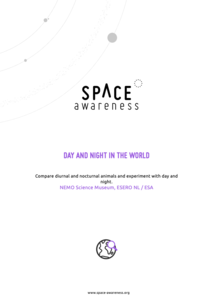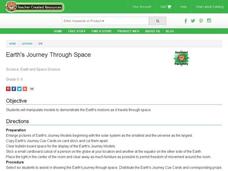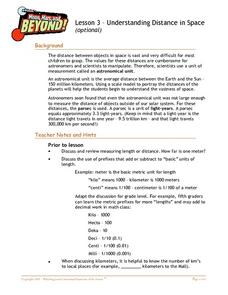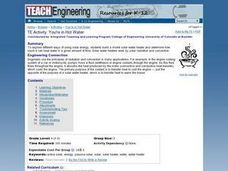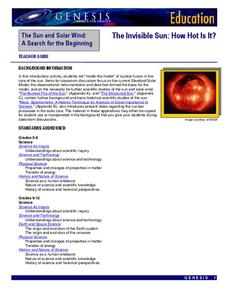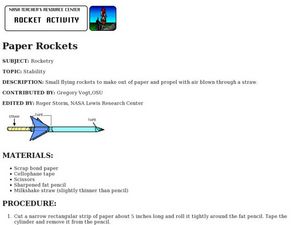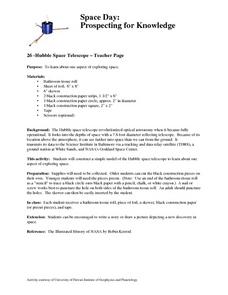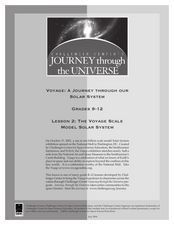Space Awareness
Day and Night in the World
How do different parts of the world experience day and night? Introduce scholars to the concept of global citizenship while teaching about animal behavior with discussion of nocturnal and diurnal animals. Then, learners complete...
Curated OER
Exploring Mars
Students, working in small groups construct scale models of the planets and solar system. They examine images of Mars and discuss what might have caused the features. They record facts about their planetary research in their journals and...
Curated OER
What's "Out" There?
First graders investigate the five outer planets. In this space science lesson plan, 1st graders read the book Our Solar System and identify the five outer planets. Students create a booklet and write about outer planets.
Curated OER
What's "In" There: A Study of the Inner Planets - Mercury, Venus, Earth, and Mars
First graders identify and explore the four inner planets. In this planet science instructional activity, 1st graders watch a PowerPoint about the planets. Students read the book Our Solar System and discuss the inner planets. Students...
Curated OER
Changing Faces: A Study of Solar and Planetary Rotation Rates
Students determine rotation rates of a variety of solar system objects using images and the Internet.
Curated OER
Meteorites
Students model how meteors fall to the surface of planets. In this space science lesson, students identify different types of meteorites using an interactive online website. They investigate the relationship between a meteorite's size...
Curated OER
Understanding the Rutherford Model
In this Rutherford model worksheet, students read about Rutherford's experiment with gold foil and alpha particles which led to the discovery of subatomic particles. Students answer six analysis questions about the experiment and...
Curated OER
Impact Craters: Holes in the Ground!
Students simulate crater formation through a lab activity. In this space science lesson, students calculate how much energy is transferred during meteorite impact. They identify different factors affecting the size and depth of craters...
Curated OER
Earth's Journey Through Space
Students arrange various pictures of the Earth to identify its journey through space. In this Earth's rotation lesson, students use models of the Earth and demonstrate its journey through space. Students complete the worksheet about the...
Curated OER
Understanding Distance in Space
Students discover the vocabulary used for distances in space and review measurement units and instruments before creating a scale model of the planets. They determine how to calculate the relative distances between the planets using a...
Curated OER
Specializing in Space
In this literature book review activity, students read a nonfiction book about space or space exploration before choosing a topic to explore further. They choose from 7 activities such as designing a model, writing a letter, write about...
Space Awareness
Measure the Solar Diameter
Scientists could measure the diameter of the sun before they knew its distance. Scholars construct a simple mirror box to measure the diameter for themselves. They compare this measurement with the official size, listed in a textbook,...
University of Colorado
Planetary Distances on the Playground
Earth is 149,600,000 km, or 92,957,130.4 miles, from the sun. Young astronauts create an interactive model to learn the distances between planets. Nine groups, each representing a different planet, are spread around at class-calculated...
NASA
Earth's Global Energy Budget
Introduce your earth science enthusiasts to the earth's energy budget. Teach them using an informative set of slides that include illuminating lecturer's notes, relevant vocabulary, embedded animations, colorful satellite maps, and a...
Curated OER
Warming the Earth
First graders investigate how the sun warms the Earth and examine the rotation of the Earth and the sun. They create an illustration of the sun, examine a solar system model, and listen to the book "The Sun: Our Nearest Star." They also...
Curated OER
Lesson Plan on Kepler's Laws of Planetary Motion
Students construct a solar system model. In this space science lesson, students calculate the eccentricity of a planet's orbit. They calculate the period of a planet's revolution using Kepler's formula.
Curated OER
TE Activity: You're in Hot Water
Students study different ways of using solar energy. They design a solar water heater and determine how much water it can heat in a set amount of time. They examine how the heaters work by solar radiation and convection.
Curated OER
Stellar Lunar Curriculum
Students engage in a lesson that covers the concept of different phases of the moon. They name the cycles of the phases of the moon while using flashlights to simulate the light of the sun. They research information about several...
University of Colorado
Looking Inside Planets
All of the gas giant's atmospheres consist of hydrogen and helium, the same gases that make up all stars. The third in a series of 22, the activity challenges pupils to make scale models of the interiors of planets in order to...
NASA
The Invisible Sun: How Hot Is It?
It's getting hot in here! The first in a series of six lessons has learners model nuclear fusion with a simple lab investigation. Groups collect data and analyze results, comparing their models to the actual process along the way.
Curated OER
Paper Rockets
Students design, construct, and fly paper rockets that travel the greatest distance possible across a floor model of the solar system. They construct small flying rockets out of paper and propel them by blowing air through a straw.
Curated OER
Spacd Day:Probing For Knowledge
Students investigate the uses and purpose of the Hubble telescope. They create a model of the telescope and conduct research about the history behind the invention of it. Students use the information in order to create a context for the...
Curated OER
Astronomy 1 Quiz- Online Interactive
In this space science worksheet, students complete 5 multiple choice questions pertaining to the planets and other space bodies. This is an online interactive quiz. Prior knowledge is assumed.
Curated OER
The Voyage Scale
High schoolers identify how models are powerful tools of exploration and that the sizes of the planets and distances between the planets in the Solar System span a large range. They make a sign for each planet they have created in the...


